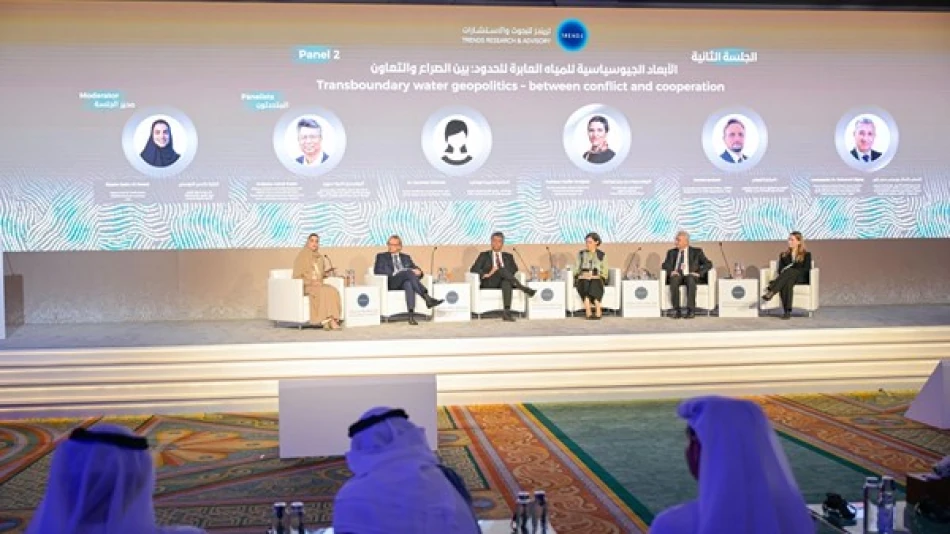
Fifth Trendz Conference Harnesses Water's Potential for Peace and Sustainable Development
Water Wars Loom as Global Security Crisis Intensifies, Experts Warn
International security experts and policymakers are sounding urgent alarms that water scarcity will define 21st-century conflicts more than any other resource, as the fifth Trends Conference on Sustainable Water Security revealed stark disparities in consumption and mounting geopolitical tensions over shared water resources. The gathering highlighted how agricultural demand consuming over 70% of global water supplies, combined with extreme regional consumption gaps, is creating conditions for unprecedented international instability.
The Coming Storm: Water as the New Oil
Former UK Defense Secretary Sir Liam Fox, now chairman of the Abraham Accords Group and author of "The Coming Storm: Why Water Will Shape the 21st Century," emphasized that water security represents the century's greatest global challenge due to its direct impact on food security and economic stability. This assessment reflects a growing consensus among defense analysts who increasingly view water through the lens of national security rather than merely environmental policy.
The warning carries particular weight given Fox's background in defense strategy and his current role in Middle Eastern diplomatic initiatives. His perspective suggests that water scarcity is transitioning from an environmental concern to a core security imperative for military planners worldwide.
Consumption Crisis: Gulf States vs. European Efficiency
The conference exposed dramatic consumption disparities that underscore the urgency of the crisis. Gulf Cooperation Council citizens consume an average of 650 liters of water daily—more than double Europe's 150-250 liter range. This gap reveals not just lifestyle differences but fundamental structural challenges in water-scarce regions that rely heavily on energy-intensive desalination.
Agricultural Dominance Drives Scarcity
With agriculture consuming over 70% of global water supplies, the sector represents both the primary challenge and the greatest opportunity for conservation. The concentration of water use in farming creates vulnerabilities in food-producing regions while offering clear targets for efficiency improvements through precision agriculture and drought-resistant crops.
This agricultural focus aligns with broader trends in water technology investment, where companies developing smart irrigation systems and water recycling solutions are attracting significant venture capital funding, particularly in water-stressed regions like California, Israel, and Australia.
Transboundary Rivers: Cooperation or Conflict
The conference's second session addressed the geopolitical powder keg of shared water resources, featuring insights from UNESCO's International Water Cooperation Chair Professor Ashok Swain and regional experts from institutions including Uppsala University and the Martti Ahtisaari Peace Foundation.
Major river systems crossing multiple borders—from the Nile and Euphrates to the Mekong and Colorado—increasingly represent flashpoints for international tension. However, experts emphasized that these same waterways could become engines of cooperation if managed through adaptive governance frameworks and joint monitoring systems.
Data Sharing as Diplomatic Tool
The session produced practical recommendations focusing on cross-border data sharing and joint monitoring mechanisms. This approach mirrors successful water diplomacy initiatives, such as the Indus Waters Treaty between India and Pakistan, which has survived multiple wars, and the International Commission for the Protection of the Rhine, which transformed a polluted waterway into a model of international cooperation.
UN Leadership and the Innovation Imperative
The conference's final session highlighted the critical role of multilateral institutions and think tanks in advancing Sustainable Development Goal 6—clean water and sanitation for all. UN advisors and climate adaptation specialists emphasized that achieving this target requires unprecedented coordination between governments, international organizations, and research institutions.
Christoph Hodder, UN advisor for climate and environmental security in Somalia, and other panelists stressed that accelerating progress demands investment in cutting-edge technologies and transforming water from a source of conflict into a driver of international cooperation.
Investment and Innovation Opportunities
The water crisis is creating substantial market opportunities in desalination technology, water recycling systems, and precision agriculture. Countries like Israel and Singapore have built competitive advantages through water innovation, while private equity firms increasingly view water technology as a defensive investment against climate change impacts.
The emphasis on treated water and rainwater harvesting as renewable resources points toward emerging markets in water capture and purification technologies, particularly in regions where traditional freshwater sources are declining due to climate change and overexploitation.
The conference's conclusions suggest that water security will increasingly determine national competitiveness and regional stability, making water policy a central element of 21st-century statecraft and economic planning.
Most Viewed News

 Layla Al Mansoori
Layla Al Mansoori






